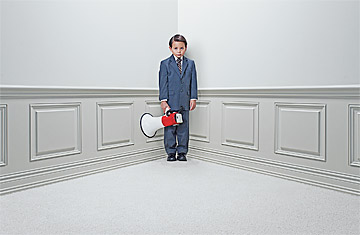
The Power of Shyness
I'm in the bathroom of the American embassy in Tokyo, and I can't leave. Somewhere in the elegant rooms beyond, the ambassador is holding his annual holiday party. Diplomats from around the world, U.S. military personnel and reporters are mingling, sipping Champagne and picking at hors d'oeuvres. As TIME's Tokyo bureau chief, I should be there, trolling for gossip or mining potential sources.
And for 20 minutes or so after arriving, despite the usual nerves, I did just that. But small talk with stiff-backed strangers at a swanky cocktail party is by far my least favorite part of my job. Send me to a famine or a flood and I'm comfortable. A few rounds of the room at a social event, however, leave me exhausted. So now and then I retreat into the solitude of the bathroom, watching the minutes tick by until I've recovered enough to go back out there.
My name is Bryan, and I'm an introvert. If this scene sounds familiar to you, then chances are that you're one too.
We're not alone, even if it sometimes feels that way. By some estimates, 30% of all people fall on the introvert end of the temperament spectrum--but it takes some explaining to understand just what that label means. For one thing, introverted does not have to mean shy, though there is overlap. Shyness is a form of anxiety characterized by inhibited behavior. It also implies a fear of social judgment that can be crippling. Shy people actively seek to avoid social situations, even ones they might want to take part in, because they may be inhibited by fear. Introverts shun social situations because, Greta Garbo--style, they simply want to be alone.
"Introverted people aren't bothered by social situations," says Louis Schmidt, director of the Child Emotion Laboratory at McMaster University in Ontario. "They just prefer not to engage." While extroverts draw energy from mingling with large groups of people--picture former President and extrovert in chief Bill Clinton joyously working a rope line--introverts find such social interactions taxing.
Simply being an introvert can also feel taxing--especially in America, land of the loud and home of the talkative. From classrooms built around group learning to open-plan offices that encourage endless meetings, it sometimes seems that the quality of your work has less value than the volume of your voice.
And as if the world weren't slanted enough toward the extrovert, study after study has made sociability seem like a prerequisite for good health, right along with low cholesterol and frequent exercise. Very shy and introverted people have been shown to succumb more rapidly to diseases like HIV and to be at greater risk for depression than their extroverted counterparts. In schools, it's the bolder kids who get attention from teachers, while quiet children can too easily languish in the back of the classroom. "Our culture expects people to be outgoing and sociable," says Christopher Lane, an English professor at Northwestern University and the author of Shyness: How Normal Behavior Became a Sickness. "It's the unstated norm, and against that norm introverts stand out as seemingly problematic."
